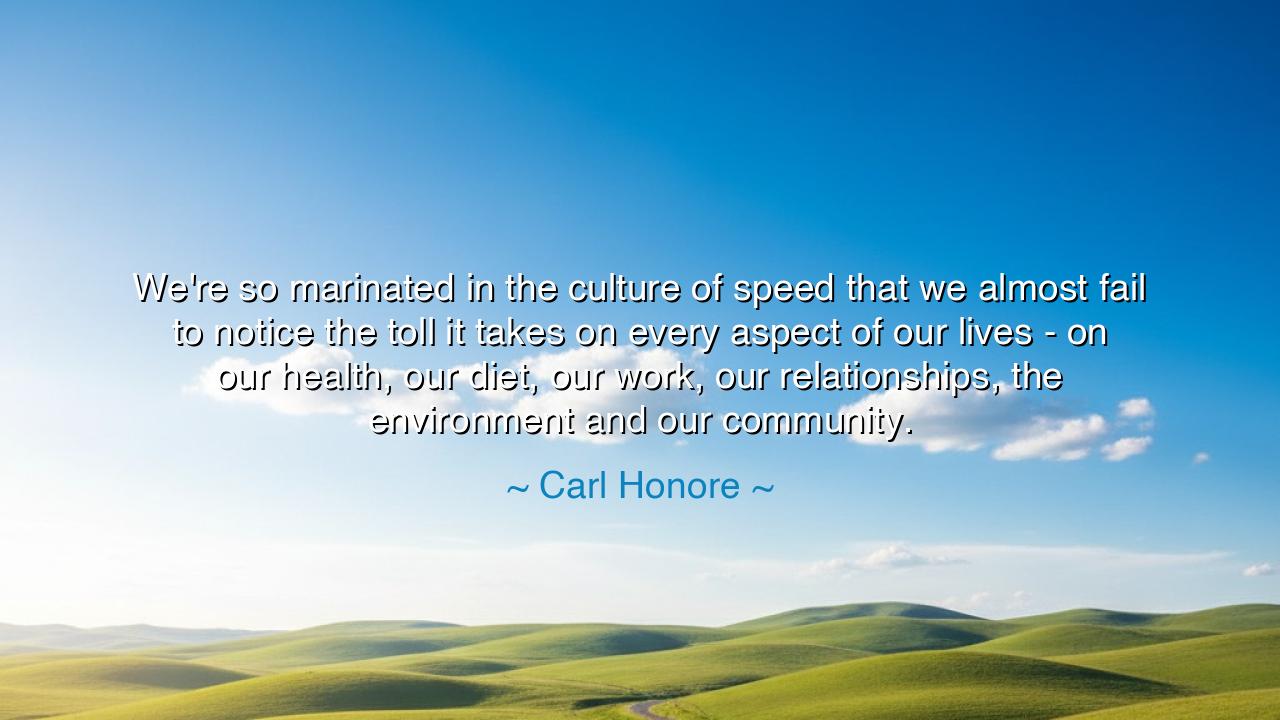
We're so marinated in the culture of speed that we almost fail to
We're so marinated in the culture of speed that we almost fail to notice the toll it takes on every aspect of our lives - on our health, our diet, our work, our relationships, the environment and our community.






In the age of restless hearts and hurried feet, Carl Honoré uttered words that pierce like a bell through the fog of modern life: “We’re so marinated in the culture of speed that we almost fail to notice the toll it takes on every aspect of our lives—on our health, our diet, our work, our relationships, the environment, and our community.” His words are not the complaint of the weary, but the lament of a prophet who has seen the cost of forgetting time’s true rhythm. For he reminds us that when life becomes a race without a finish line, even victory feels like loss.
The origin of this quote springs from Honoré’s movement known as the “Slow Movement,” born of his book In Praise of Slow. It is a rebellion not against progress, but against haste—a call to remember that swiftness without purpose is emptiness in motion. His words rise from the heart of the modern condition, where every breath is measured, every moment monetized, and still the hunger for “more” remains unsatisfied. He calls us to pause, not in idleness, but in awareness; to rediscover the ancient truth that speed is no virtue when it costs the soul its peace.
The ancients, wiser in their simplicity, knew this truth well. In the East, the sages of China spoke of Wu Wei—action through stillness, motion in harmony with nature’s pace. In the West, the philosopher Seneca warned that “life is long if you know how to use it,” teaching that busyness often disguises waste. And even in the fields of Greece, the farmer looked to the seasons, understanding that fruit ripens not when forced, but when allowed. Our ancestors moved with the world’s breath; we, their hurried descendants, have learned to run against it.
To live in the culture of speed is to worship the false god of urgency. We rise to alarms and rush to deadlines; we eat without tasting, speak without listening, and work without meaning. We scroll through life as though it were a list to be completed rather than a melody to be played. Honoré’s warning is not against technology or ambition—it is against the blindness that comes from haste. When one moves too fast, the world blurs; when everything is urgent, nothing is sacred. The toll he speaks of is not abstract—it is measured in exhaustion, anxiety, and the quiet erosion of our humanity.
Consider the story of Leo Tolstoy, who in his later years withdrew from the comforts of wealth and fame to live simply on the land. He wrote that man spends his days “chasing happiness like a shadow,” only to discover that it was always at his heels, waiting for him to stop. His retreat was not from society but from the madness of perpetual striving. Like Tolstoy, Honoré calls us to rediscover joy in the present moment—in the shared meal, the slow walk, the silence between heartbeats. For these are not wastes of time, but its true sanctuaries.
The lesson, then, is as clear as it is difficult: slowness is not weakness—it is wisdom. To move slowly is to move deliberately, to live in full consciousness of what is before us. It means reclaiming our bodies from fatigue, our hearts from distraction, and our relationships from neglect. It is to give the world back its color by refusing to rush through it in black and white. The poet Rumi said, “When you stop chasing everything, the soul arrives.” So too does peace return when one no longer races the clock, but walks beside it.
If we would heed Carl Honoré’s counsel, let us begin with small rebellions. Eat a meal without a screen. Walk without haste, even if the world rushes around you. Listen with patience, speak with care. Create space in your days not for doing, but for being. For time, once slowed, reveals its true abundance. The river of life need not be dammed or forced—it flows best when left to its natural course.
And thus, the wisdom of the ancients and the modern sage meet in one truth: life’s richness is found not in its speed, but in its depth. When we slow down, we begin to see the sacred in the ordinary—the laughter of children, the warmth of the sun, the taste of bread. These are the treasures haste cannot buy. So let us step out of the storm of speed, breathe deeply, and remember that the art of living has always been, and will always be, the art of slowing down.






AAdministratorAdministrator
Welcome, honored guests. Please leave a comment, we will respond soon